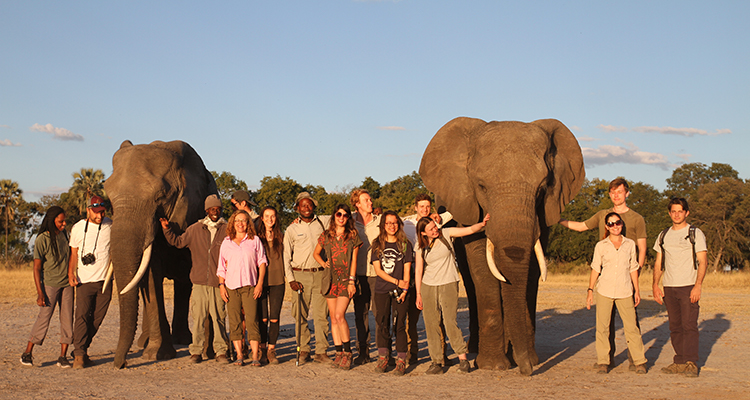
Students explored the wonders of the Okavango Delta before the signing of an agreement with the University of Botswana to develop exciting educational ties.
Students from UNSW Sydney, Arizona State University and King’s College London joined leading water resource experts on a ten-day learning adventure over July in one of the world’s most spectacular eco-systems – the Okavango Delta in Botswana.
The impact of the trip will be felt for years to come, with UNSW signing a Memorandum of Understanding (MOU) with the Okavango Research Institute at the University of Botswana. The aim of the MOU is to develop new partnerships involving the PLuS Alliance. It provides opportunities for guest lectures by University of Botswana academics, co-supervision of postgraduate research students, scholarships for undergraduate and postgraduate students at the University of Botswana, and future research partnerships.
"The MOU is a fantastic initiative. We are already hoping to establish two undergraduate scholarships for exceptional University of Botswana students to join our undergraduate course in 2019,” said Professor Richard Kingsford, Director of the Centre for Ecosystem Science at UNSW and the developer of the study abroad program.
“We are also well on the way to establishing co-supervision of UNSW postgraduates by researchers at the Okavango Research Institute working on social-ecological systems in Botswana. The future holds promise for potential postgraduates from the University of Botswana at UNSW, working in Botswana on the challenges of sustainable management and research collaboration".
The annual PLuS Alliance study abroad program offers students the opportunity to conduct practical field-research in the UNESCO world heritage site and learn about the global challenges of water conservation and governance. The program is led by a team of experts across the three universities, who are collaborating on a PLuS Alliance accelerator-funded research project on transboundary river governance and water security.
After arriving in Maun, Botswana on flights from Phoenix, London and Sydney, the 13 students spent two days acclimatising, meeting their peers from partner universities, and taking part in lectures on transboundary river basin management, survey protocols, the social-ecological relationships impacting the Delta and the role of tourism in the region. The group then took a 30-minute flight into the research camp of their NGO partner, Elephants Without Borders, where they surveyed water quality, vegetation and other organisms, and set up camera traps (which later captured movement from hyenas and leopards).
Professor Kingsford added that the trip was a fantastic opportunity for students to experience being part of a global team.
“Not only did our students develop key practical skills and gain exposure to the wide range of political, social, economic and environmental factors that influence water conversation and governance, but they were surrounded by faculty and peers from different universities in one of the most beautiful and wild places in the world.”
The Okavango Delta is a hotspot of biodiversity, and students were lucky enough to see a range of magnificent wildlife on safari drives and from a boat provided by the Abu Concession. These included wading elephants, cape buffalo, red lechwe, warthogs, baboons, hippos and water-birds such as fish eagles, African jacana and malachite kingfishers.
“It was fantastic to be in the Delta surrounded by water lilies and majestic wild animals,” said Georgia Edward, a second-year geography student at King’s. “I would like to say a big thank you to all of the people on the trip for making it such an enjoyable experience and the lecturers for bringing their wealth of knowledge.”
“As part of the PLuS Alliance, we get to learn from people who are working and studying at institutions that are quite different in their approaches,” said Dr Michael Chadwick, the faculty lead from King’s.
“Seeing the interactions between students from different universities, and from second year undergraduates through to PhD candidates, was my favourite aspect of the course – other than the mayflies!”
This year’s program was expanded to ASU students for the first time, with six students from the university attending over their summer break.
Leah Jones, who received a travel grant from ASU and the PLuS Alliance for the trip, said that it was a “once-in-a-lifetime experience … jaw-dropping, eye-opening and life-changing.” She was excited to develop skills in species identification, water quality testing and estimating animal population densities, as well as a new understanding of the challenges of river basin management across international boundaries.
“With all of the learning, I also had great fun going on game drives and seeing the large African megafauna – and even getting to feed a local herd of elephants,” added Leah. “I also really enjoyed connecting with the students and faculty from UNSW and King’s. Building friendships with students from around the world was one of the biggest highlights of the program.”
Professor Dave White from the Julie Ann Wrigley Global Institute of Sustainability at ASU said the trip was “truly transformational”, not only for the students, but the professors as well.
“This is the type of immersive, global field experience that allows students to apply concepts learned in the classroom to real-world sustainability challenges. It forces them to challenge their assumptions and form a perspective based not just on readings and lectures, but also first-hand experience. We were able to collaborate with our local partners in Botswana, especially Elephants Without Borders, to examine the intersection of water, ecosystems, and governance from multiple academic and cultural perspectives. As a professor, I was proud to see the students work hard, make new friends, and spark their passion for conservation."
- Log in to post comments
